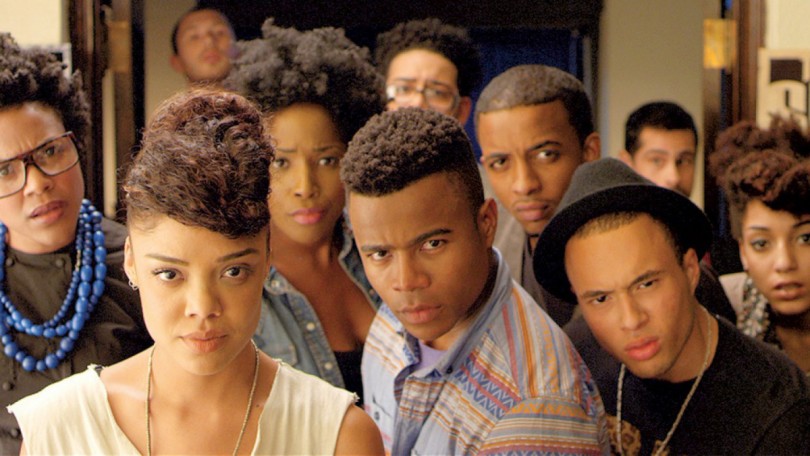Dear White People
Director: Justin Simien
(Blu-ray/DVD)
A-
In the wake of Michael Brown’s death, Oscar revelations, and an apparent epidemic of countless human resource reps admitting to adult onset “colorblindness,” Justin Simien’s directorial debut, Dear White People, is a painfully accurate and undeniably important satire. The movie hits its stride not by bombarding us with a caravan of self-aware caricatures or Chappelle-inspired scenarios, but with an emphasis on the daily interactions that we have most certainly encountered. There are no shootings, no riots, no needlessly dramatic discourse, no Klan members, and no bloodstained illustration of plight. Just life, which in this case is far more harrowing.
Assuming a chapter-driven structure, Dear White People trails four black students through their fall semester at Winchester University, a fictional Ivy League school with a pedigree obliviously steeped in prejudice. Lionel Higgins (Tyler James Williams) is first to be introduced, a gay sophomore recently forced out of his dorm by the institution’s president’s racist son, Kurt (Kyle Gallner). Next is Samantha White (Tessa Thompson), an ambitious filmmaker, writer, and radio host responsible for the broadcast from which the film assumes its namesake. Afterwards, Colandrea “Coco” Conners (Teyonah Parris) seeks to achieve fame via her growing vlog with the seemingly clever implementation of a stereotypical persona, all while being observed and encouraged by a reality television producer. Finally, Troy Fairbanks (Brandon Bell) emerges, freshly removed from his office as head of his dorm and struggling to reconcile the wishes of the dean and his father (Dennis Haysbert) with the racially insensitive demeanors of the university’s benefactors. With time, each student’s tales intersect, forging a path toward self-actualization and the further understanding of a veiled, yet still segregated, society.
Simien, assuming the writing reigns as well, expertly crafts a believable environment, populating Winchester with both accurate archetypes and inadvertently hilarious buffoons carrying a tinge of National Lampoon. Unlike the humor of the aforementioned publication, Simien’s screenplay packs a reflective punch as well. In one particular instance, Sam presents a silent short film, Rebirth of a Nation, a parody of the white populace’s reaction to Barack Obama’s reelection in the vein of D. W. Griffith’s century-old racist opus. After being deemed “thematically dubious” by a critical classmate, a debate ensues, taking an intricate tangent through the nature of race, film, and back again. In tandem with this, scenes of parallel conversations involving the four central students are scattered throughout the film, revealing the inadvertent similarities between individuals juxtaposed. Exchanges between the cast are perpetually lively, but not too much so that the film’s pace is jarred in moments of contemplation.
Dear White People’s social insight truly qualifies the film’s staying power. Spike Lee’s Bamboozled, bell hooks, and Toni Morrison quickly come to mind by the time the first act has run its course. Despite the qualified roots, however, the film continues to offer something invigorating, raw, and incredibly in tune with contemporary racial discussions. To a further extent, the piece also explores a deeper epiphany: What avenue does an individual trek down, for example, when they are culturally estranged? To unfortunately spoil this query, the question goes answered. However, what the film does propose is enough to instigate prevailing consideration long after the notably intriguing end credits.
Criticisms are sparse for a work such as this, but not completely absent. The visual gradient of the film can seem a bit overbearing, and the clean-cut collegiate aesthetic leaves something to be desired. However, the simplicity does drive further attention to the exceptional performers, and Topher Osborn’s frequent symmetry emphasizes spoken schisms (though perhaps unintentionally). Overall, the minute hiccups the film sports do little to depreciate its well-earned value.
Dear White People is a film that, though largely hushed, may very well prevail in the coming years. Instructional without being redundant or dogmatic, the films stands its own with its discourse, humor, and realism. In doing so, Justin Simien has formed a momentous blip on the cinema radar that will resound for decades.





